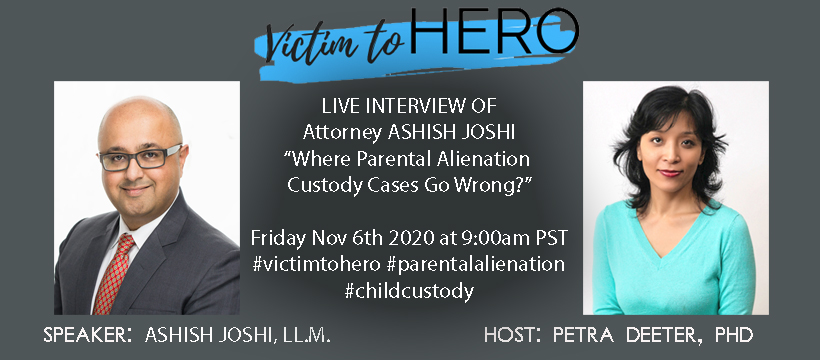Attorney Ashish Joshi specializes in high stake disputes and litigation, such as severe parental alienation and psychological maltreatment of children, false allegations of child abuse, recovery of abducted children… He has counseled and/or represented clients in state and federal courts across the United States and internationally.
In this live interview, Dr. Petra Deeter asked Attorney Ashish Joshi about the strategy to fight parental alienation in court. Joshi emphasized on what YOUR lawyers should know and where parental alienation cases go wrong.
Watch a part of the interview here:
To get notified of how to join future live events, please join our mailing list.
Key takeaways:
- Frame the case appropriately. A case involving parental alienation is a case of child abuse. It’s NOT about child custody, it’s NOT about parenting time. It’s about protecting the child from ongoing psychological abuse. Psychological harm is as harmful, perhaps more so than physical abuse or sexual abuse. Studies have demonstrated this.
- It is a mistake to think like a lawyer when handling a case of PA. PA is counterintuitive, profoundly counterintuitive. Typically, family law practitioners like to get along with their colleagues, judges, the professional legal community. They believe that arguing parental alienation and asking for appropriate interventions may seem “aggressive.” It’s not. Ask yourself: if a parent came to you and told you that their child was being sexually abused by the other parent, would your reaction differ? Would you advise that parents show “patience”? Would you recommend traditional therapy? Or would you get off your butt and go to the Court to demand an urgent intervention? This is no different.
- Think carefully before using the term “Parental Alienation.” As with many things in life, with regards to PA, we have good news and bad. The good news is that we now have court decisions from family courts across America that have acknowledged the harm that parental alienation causes to the children. The bad news is that now that the term is widely accepted, it has spilled over in the “overkill” zone. Make sure that you have EVIDENCE to justify using the term PA. The last thing you want is to desensitize a judge to the term or worse, lose credibility. You don’t want to be the parent who cried wolf!
- Do your diligence before asking for or agreeing to the appointment of a Guardian ad Litem or an attorney for the minor child. More often than not, these professionals know little about Parental Alienation and little to no experience in handling cases involving parental alienation. Sometimes it’s worse than that. Sometimes you find professionals who have outdated or misguided notions about parental alienation and are ignorant of (or willfully blind to) the research supporting parental alienation. If you are going to get such a professional appointed on your case, make sure that you or your lawyer do the proper diligence and ensure that you have the right person for the job.
- Don’t hesitate or fight against getting professional help if necessary. Targeted parents demonstrate 4 As: Anxious, Agitated, Angry, and Afraid. It’s because they are trauma victims. Their anxiety, frustration, outrage is often seen as an “anger issue” and a “problem” that needs to be fixed. Targeted parents often make suboptimal parenting or other decisions, which makes the case more complex or worse. Often a reaction to alienation is confused with causation. Is the mom angry because her kids are alienated and rejecting her without justification – or – is it the other way around? When you are in a hole, STOP digging. Try to avoid lashing out at your lawyer or the judge or the therapist on social media. Everything that you post on the internet has eternal life. You don’t want to be embarrassed in court or cross-examined on something that you posted in a fit of anger. Protect the privacy of your children. Support groups are great and can offer encouragement and guidance. But beware of the rumor mills and gossip groups. If all the group is doing is to badmouth the legal and mental health community and talk about the “corruption” of the family courts, it’s more likely than not unhelpful.
- Demand an evidentiary hearing or a trial. Put your proof on the record. One way to prove parental alienation in a court of law is by using the Five-Factor Model.
- Hold the professionals accountable. That includes lawyers, judges, therapists, and every court-involved professional. Sometimes when I come into a case outside of Michigan where I live, the local lawyer tells me that “our judge is not big on PA” or that “s/he is not a believer in PA.” Now, I don’t know whether that’s factually true or not and whether a judge would actually say this, but if it is, it’s pure nonsense. It’s like a judge telling you that he or she doesn’t believe in autism or domestic violence. With the magnitude of peer-reviewed research and judicial decisions we have on parental alienation, it would be highly incompetent for any legal professional, much less a family court judge, to say that he or she doesn’t believe in PA.
- In other instances, you may have a therapist who’s crossing the boundaries between a therapeutic relationship and forensic practice. For example, it’s generally improper for a child’s treating therapist to make recommendations about custody and parenting time. That would be wearing dual hats and engaging in multiple roles, which is not allowed by the code of ethics and rules of professional conduct. Ask your lawyer to research the applicable rules and if there is a violation, file a complaint with the appropriate licensing board. Send out cease and desist notice to the therapist in question. Subpoena their file. Ask them to preserve the records.

